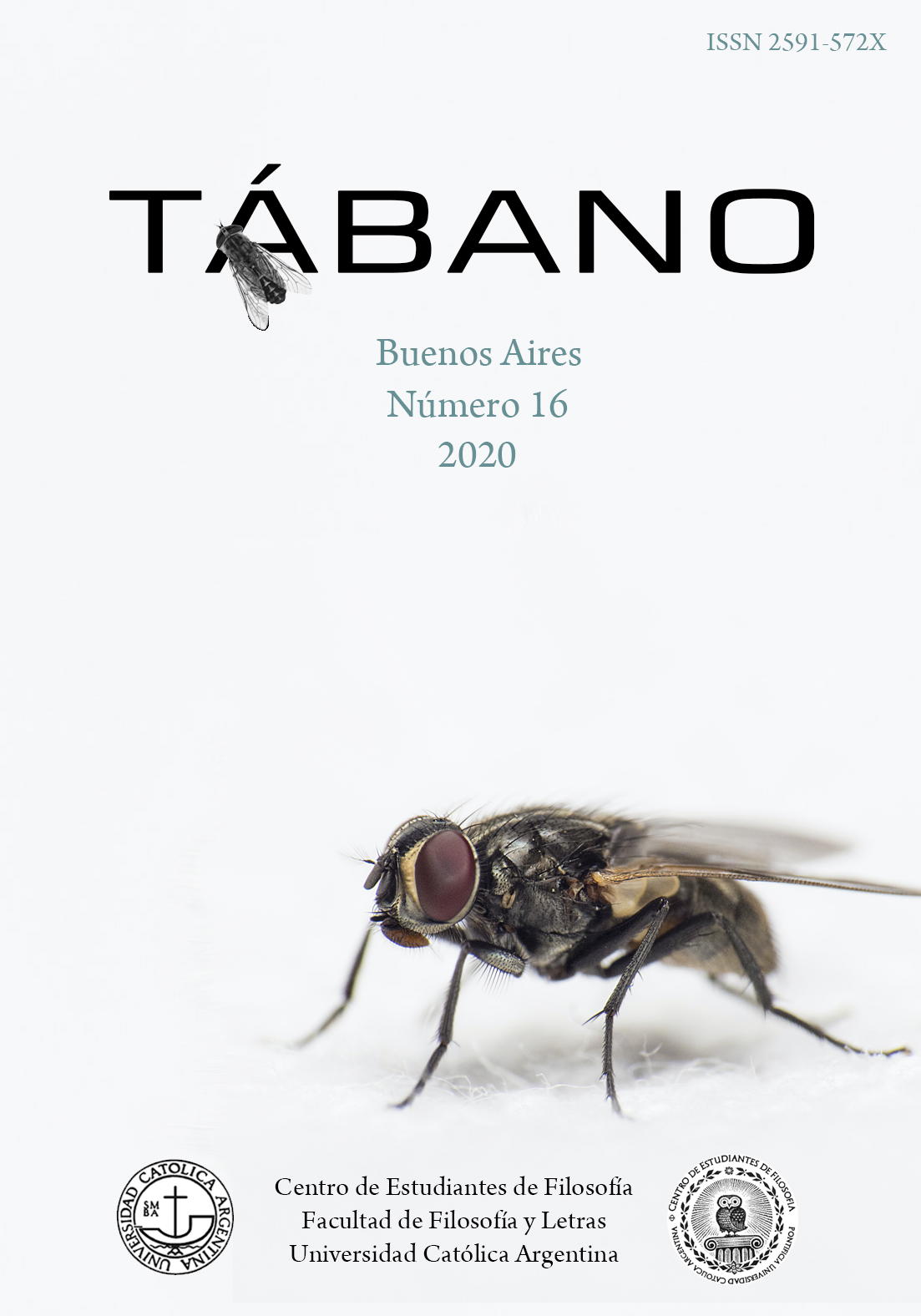Merleau-Ponty and the philosophy of the sensible as literature
DOI:
https://doi.org/10.46553/tab.16.2020.p25-39Keywords:
Merleau-Ponty, philosophy, literature, sensible, expressionAbstract
The article examines the possibility of identifying an incipient philosophy of the sensible as literature exhibited in the last period of Merleau-Ponty´s works. A philosophy understood in the terms of literature is a project that the philosopher foretells but which he does not achieve because of his sudden death. The aim of the article will be to propose three essential axes to elaborate this philosophy: 1. The philosophy of the sensible as a field of creation, 2. A philosophy that appeals to the literary use of language, and 3. The philosopher-writer subject of the philosophy of the sensible as literature. We will use the unfinished Merleau-Ponty´s diptych, composed of The Prose of the World and The Visible and the Invisible, and the two courses on literature dictated by him: Recherches sur l’usage littéraire du langage and Le problème de la parole, to trace these key aspects. The article examines the possibility of identifying an incipient philosophy of the sensible as literature exhibited in the last period of Merleau-Ponty´s works. A philosophy understood in the terms of literature is a project that the philosopher foretells but which he does not achieve because of his sudden death. The aim of the article will be to propose three essential axes to elaborate this philosophy: 1. The philosophy of the sensible as a field of creation, 2. A philosophy that appeals to the literary use of language, and 3. The philosopher-writer subject of the philosophy of the sensible as literature. We will use the unfinished Merleau-Ponty´s diptych, composed of The Prose of the World and The Visible and the Invisible, and the two courses on literature dictated by him: Recherches sur l’usage littéraire du langage and Le problème de la parole, to trace these key aspects.Downloads
References
Alloa, E. (2020). Le premier livre de Merleau-Ponty, un roman. Chiasmi International (21), Edizione Mimesis, pp. 253-268.
Apostolopoulos, D. (2018). The Systematic Import of Merleau-Ponty’s Philosophy of Literature. Journal of the British Society for Phenomenology, 49:1, pp. 1-17.
Bernet, R. (2017). Philosophy and Literature – Literature and Philosophy. Chiasmi International (19), Edizione Mimesis, pp. 255-270.
Buceta, M. (2017). Analogía y sublimación: una respuesta al problema del pasaje del silencio a la palabra en la filosofía de Merleau-Ponty. Areté. Revista de Filosofía, vol. XXIX (2), pp. 333-360.
Buceta, M. (2018). Las ideas sensibles entre Merleua-Ponty y Proust. Diálogos, pp. 123-148.
Buceta, M. (2019). Merleau-Ponty lector de Proust: lenguaje y verdad, Bs. As.: SB.
Carbone, M. (2015). Una deformación sin precedentes. Marcel Proust y las ideas sensibles. Barcelona: Anthropos.
Farrés Famadas, G. (2011). Merleau-Ponty, lector de Proust. Una presencia invisible”. Paideia, Vol. 30, (90), pp. 79-93.
Lefort, C. (1964). Préface. En M. Merleau-Ponty. L’oeil et l’esprit. Paris: Gallimard.
Lefort, C. (1969). Avertissement. En M. Merleau-Ponty (1969). La prose du monde, Paris: Gallimard.
Merleau-Ponty, M. (1945). Phénoménologie de la perception. Paris: Gallimard.
Merleau-Ponty, M. (1948). Sens et non-sens. Paris: Nagel.
Merleau-Ponty, M. (1960). Signes. Paris: Gallimard.
Merleau-Ponty, M. (1964). Le visible et l’invisible. Paris: Gallimard.
Merleau-Ponty, M. (1968). Résumés de cours. Collège de France 1952-1960. Paris: Gallimard.
Merleau-Ponty, M. (1969). La prose du monde. Paris: Gallimard.
Merleau-Ponty, M. (2000). Parcours deux 1951-1961. Lonrai: Verdier.
Merleau-Ponty, M. (2002). Causeries. Paris: Du Seuil.
Merleau-Ponty, M. (2003). L´institution dans l´histoire personnelle et publique. Le problème de la passivité, le sommeil, l´inconscient, la mémoire. Notes de Cours au Collège de France 1954-1955. Paris: Belin.
Merleau-Ponty, M. (2011). Le monde sensible et le monde de l´expression. Cours au Collège de France. Notes 1953. Genêve: MêtisPresses.
Merleau-Ponty, M. (2013). Recherches sur l’usage littéraire du langage. Cours au Collège de France. Notes 1953. Genêve: MêtisPresses.
Merleau-Ponty, M. (2020). Le problème de la parole. Cours au Collège de France. Notes 1953-1954. Genêve: MêtisPresses.
Proust, M. (1987). Du côté de chez Swann. Présentation d´Antoine Compagnon. Paris: Gallimard.
Renouard, M. (2005). Littérature. En Maurice Merleau-Ponty. Paris: ADPF.
Robert, F. (2008). Écriture et vérité. Revue internationale de philosophie, (2) nr. 244, pp. 149-166.
Zacarello, B. (2013). Pour une littérature (-) pensée. Avant-propos. En M. Merleau-Ponty (2013). Recherches sur l’usage littéraire du langage. Cours au Collège de France. Notes 1953. Genêve: MêtisPresses.
Waldenfels, B., (1989). Vérité à faire. La question de la vérité chez Merleau-Ponty. Les Cahiers de Philosophie, 7, pp. 55-68.
Downloads
Published
How to Cite
Issue
Section
License


